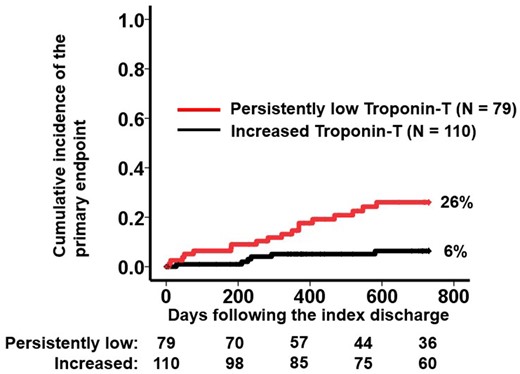-
PDF
- Split View
-
Views
-
Cite
Cite
T Imamura, A Oshima, H Onoda, S Tanaka, R Ushijima, M Sobajima, N Fukuda, H Ueno, K Kinugawa, Clinical implications of troponin-T elevations following TAVR, European Heart Journal, Volume 43, Issue Supplement_1, February 2022, ehab849.104, https://doi.org/10.1093/eurheartj/ehab849.104
Close - Share Icon Share
Abstract
Type of funding sources: None.
Baseline and post-procedural elevations in serum troponin-T levels are associated with increased morbidity and mortality following transcatheter aortic valve replacement (TAVR). However, the prognostic impact of change in serum troponin-T level following TAVR remains unknown.
Among the patients with severe aortic stenosis who underwent TAVR, those with baseline serum troponin-T level ≥51.5 ng/L were excluded. The impact of increases in serum troponin-T level to an abnormally high range (≥51.5 ng/L) following TAVR on 2-year cardiovascular death or heart failure readmissions was investigated.
Among 189 included patients (median 86 years old, 28% men), serum troponin-T level increased in 79 patients following TAVR. An increase in serum troponin-T was associated with a higher rate of 30-day adverse events, predominantly due to pacemaker implantation for complete atrio-ventricular block, and a higher 2-year cumulative incidence of the primary endpoint (hazard ratio 3.97, 95% confidence interval 1.51-10.4, p = 0.005) adjusted for the use of balloon-expandable valve and post-TAVR pacemaker implantation (Figure 1).

Abstract Figure. Cumulative incidence of endpoint



